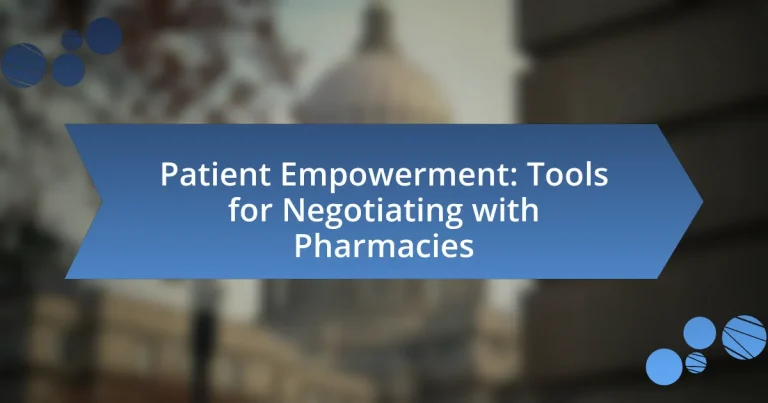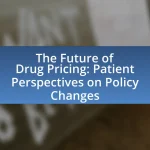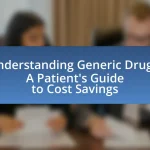Patient empowerment in pharmacy negotiation is the process through which patients acquire the knowledge and skills necessary to actively engage in discussions about their medication and treatment options. This article explores how patient empowerment enhances interactions with pharmacies, influences medication adherence, and improves health outcomes. Key principles of patient empowerment, such as informed decision-making and self-management, are examined alongside the challenges patients face during negotiations. Additionally, the article highlights tools and strategies, including technology and effective communication, that patients can use to advocate for themselves and achieve better pricing and treatment options at pharmacies.
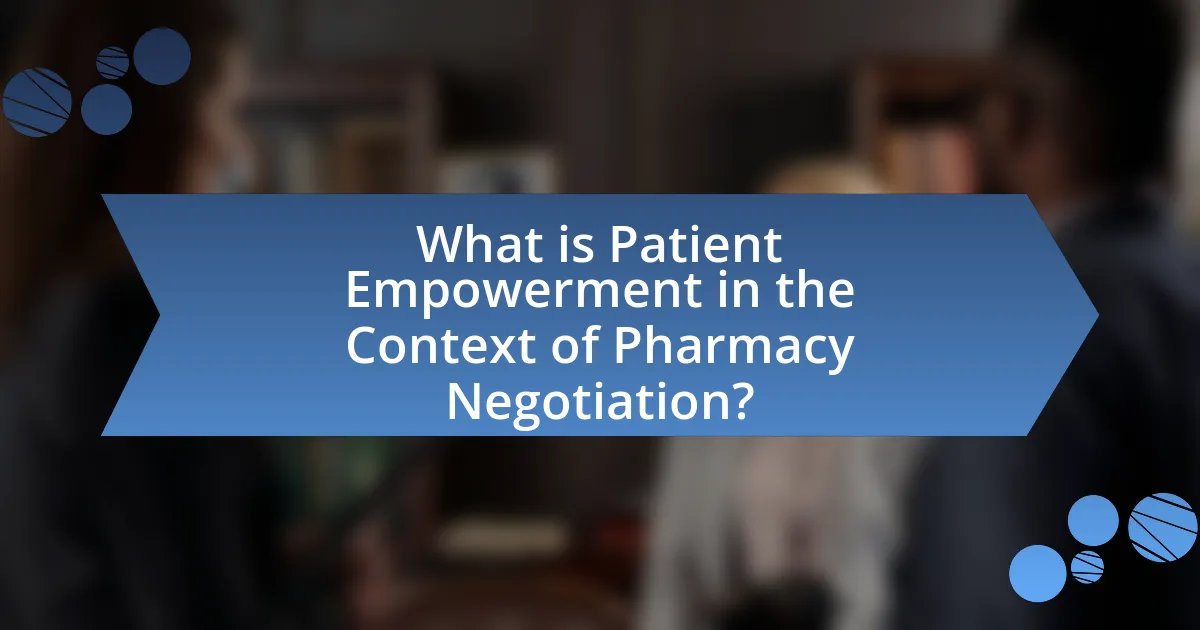
What is Patient Empowerment in the Context of Pharmacy Negotiation?
Patient empowerment in the context of pharmacy negotiation refers to the process by which patients gain the knowledge, skills, and confidence to actively participate in discussions and decisions regarding their medication and treatment options. This empowerment enables patients to negotiate more effectively with pharmacists and healthcare providers, ensuring that their preferences and needs are considered in the decision-making process. Research indicates that empowered patients are more likely to adhere to treatment plans and achieve better health outcomes, as they feel more in control of their healthcare decisions.
How does Patient Empowerment influence interactions with pharmacies?
Patient empowerment significantly enhances interactions with pharmacies by enabling patients to take an active role in their healthcare decisions. Empowered patients are more likely to engage in discussions about their medications, ask questions, and express preferences, which fosters better communication with pharmacy staff. Research indicates that when patients feel informed and confident, they are more likely to adhere to medication regimens and report satisfaction with their pharmacy services. For instance, a study published in the Journal of Managed Care & Specialty Pharmacy found that patient engagement initiatives led to improved medication adherence rates, demonstrating the positive impact of empowerment on pharmacy interactions.
What are the key principles of Patient Empowerment?
The key principles of Patient Empowerment include informed decision-making, self-management, and active participation in healthcare. Informed decision-making allows patients to understand their health conditions and treatment options, enabling them to make choices that align with their values and preferences. Self-management emphasizes the importance of patients taking responsibility for their health through lifestyle changes and adherence to treatment plans. Active participation involves engaging in discussions with healthcare providers, asking questions, and advocating for one’s own health needs. These principles are supported by research indicating that empowered patients experience better health outcomes and increased satisfaction with their care.
How does Patient Empowerment affect medication adherence?
Patient empowerment significantly enhances medication adherence by fostering a sense of ownership and responsibility in patients regarding their health. When patients are empowered, they are more likely to engage in their treatment plans, understand their medications, and communicate effectively with healthcare providers. Research indicates that empowered patients demonstrate a 30% increase in adherence rates compared to those who are not engaged in their care. This improvement is attributed to better knowledge of their conditions and medications, which leads to increased motivation to follow prescribed regimens.
Why is negotiating with pharmacies important for patients?
Negotiating with pharmacies is important for patients because it can lead to lower medication costs and improved access to necessary treatments. By engaging in negotiations, patients can advocate for better pricing, discounts, or alternative options that may not be initially presented by the pharmacy. Studies indicate that patients who actively negotiate or inquire about pricing can save significant amounts on their prescriptions, with some reports showing savings of up to 30% or more on certain medications. This proactive approach not only enhances affordability but also empowers patients to take control of their healthcare decisions.
What challenges do patients face when negotiating with pharmacies?
Patients face several challenges when negotiating with pharmacies, including lack of knowledge about medication prices and insurance coverage. Many patients are unaware of the actual costs of their prescriptions, which can lead to confusion and frustration during negotiations. Additionally, the complexity of insurance plans often makes it difficult for patients to understand their benefits, resulting in unexpected out-of-pocket expenses. A study by the Kaiser Family Foundation found that nearly 30% of Americans reported difficulty affording their medications, highlighting the financial pressure patients experience. Furthermore, patients may encounter unresponsive pharmacy staff or limited options for price comparisons, further complicating the negotiation process. These factors collectively hinder patients’ ability to effectively advocate for themselves in pharmacy settings.
How can effective negotiation improve patient outcomes?
Effective negotiation can significantly improve patient outcomes by ensuring that patients receive tailored treatment plans that align with their individual needs and preferences. When healthcare providers engage in effective negotiation with patients, they foster open communication, which leads to better understanding of treatment options and adherence to prescribed therapies. Research indicates that patients who actively participate in their healthcare decisions are more likely to follow through with treatment regimens, resulting in improved health metrics and satisfaction levels. For instance, a study published in the Journal of Health Communication found that shared decision-making, a form of negotiation, enhances patient engagement and leads to better health outcomes.
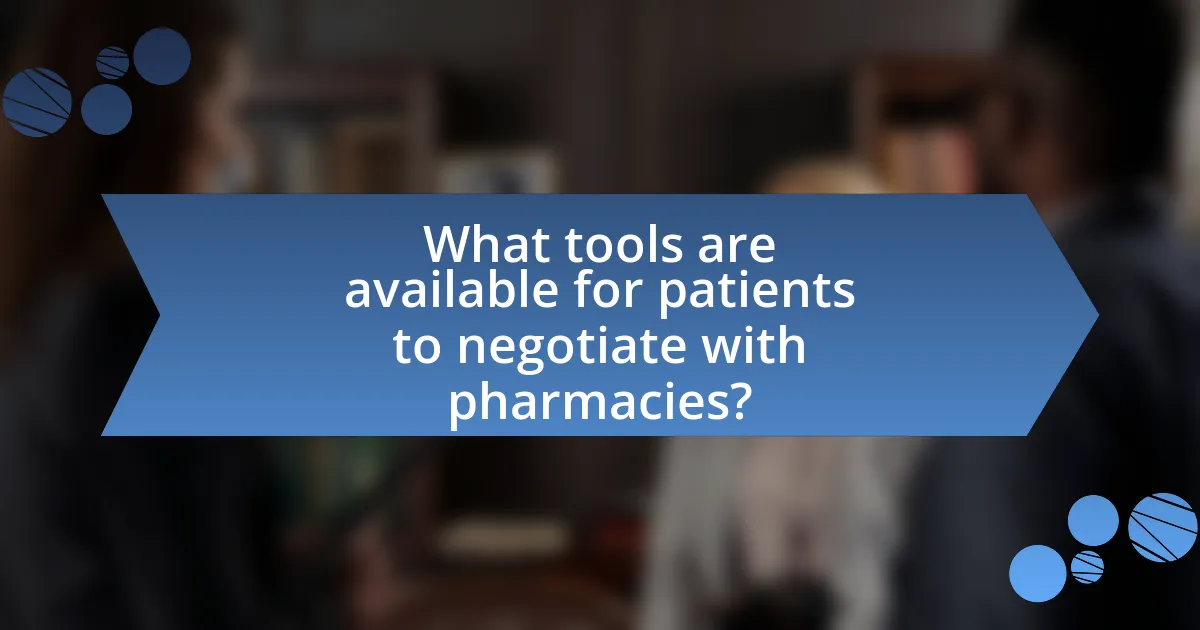
What tools are available for patients to negotiate with pharmacies?
Patients can utilize several tools to negotiate with pharmacies, including price comparison apps, discount cards, and prescription savings programs. Price comparison apps, such as GoodRx and RxSaver, allow patients to compare medication prices across different pharmacies, enabling them to find the best deal. Discount cards, like those offered by NeedyMeds or SingleCare, provide immediate savings on prescriptions at participating pharmacies. Additionally, many pharmaceutical companies offer prescription savings programs that can reduce costs for patients who meet specific eligibility criteria. These tools empower patients to make informed decisions and potentially lower their out-of-pocket expenses for medications.
How can patients utilize technology in pharmacy negotiations?
Patients can utilize technology in pharmacy negotiations by leveraging online price comparison tools and mobile applications that provide real-time information on medication costs and available discounts. These digital resources enable patients to compare prices across different pharmacies, ensuring they can negotiate effectively based on accurate data. For instance, platforms like GoodRx allow users to find the lowest prices for prescriptions and access coupons, which can be presented during negotiations to secure better deals. Additionally, telehealth services can facilitate communication with healthcare providers, enabling patients to discuss medication options and potential alternatives that may be more affordable, thus strengthening their negotiating position.
What apps and online resources assist in medication price comparisons?
Apps and online resources that assist in medication price comparisons include GoodRx, RxSaver, and Blink Health. GoodRx provides users with price comparisons for prescription medications at various pharmacies, often offering coupons to reduce costs. RxSaver similarly allows users to compare prices and find discounts on medications, while Blink Health enables users to purchase medications online at discounted rates. These platforms have been shown to help consumers save significantly on their medication expenses, with GoodRx reporting that users can save an average of 80% on prescriptions.
How do telehealth services enhance negotiation capabilities?
Telehealth services enhance negotiation capabilities by providing patients with immediate access to healthcare professionals, enabling informed discussions about treatment options and medication costs. This accessibility allows patients to gather necessary information and advocate for their needs effectively during negotiations with pharmacies. For instance, studies show that patients who engage in telehealth consultations are more likely to understand their treatment plans and medication pricing, leading to better negotiation outcomes.
What role does communication play in negotiating with pharmacies?
Communication is essential in negotiating with pharmacies as it facilitates understanding and clarity between patients and pharmacy staff. Effective communication allows patients to articulate their needs, preferences, and concerns regarding medications, which can lead to better outcomes and tailored solutions. Studies indicate that clear dialogue can enhance patient satisfaction and adherence to treatment plans, as patients feel more involved in their healthcare decisions. Furthermore, strong communication skills can help patients negotiate for better prices, alternative medications, or assistance programs, ultimately empowering them in their healthcare journey.
How can patients effectively communicate their needs to pharmacists?
Patients can effectively communicate their needs to pharmacists by being clear and specific about their medication requirements and health concerns. This includes providing detailed information about their medical history, current medications, and any allergies or side effects experienced. Research indicates that effective communication can lead to better medication management and adherence, as pharmacists are better equipped to provide tailored advice and support when they have comprehensive information. For instance, a study published in the Journal of the American Pharmacists Association found that patients who actively engaged in discussions with their pharmacists reported higher satisfaction and improved health outcomes.
What strategies can patients use to advocate for themselves?
Patients can advocate for themselves by actively engaging in their healthcare decisions, which includes asking questions, seeking second opinions, and being informed about their medications and treatment options. By preparing a list of questions before appointments, patients can ensure they address all concerns, leading to better understanding and involvement in their care. Research indicates that patients who are informed about their conditions and treatment options are more likely to adhere to their treatment plans and experience better health outcomes. Additionally, maintaining open communication with healthcare providers fosters a collaborative relationship, empowering patients to express their needs and preferences effectively.

What are the best practices for successful pharmacy negotiations?
The best practices for successful pharmacy negotiations include thorough preparation, clear communication, and understanding the pharmacy’s perspective. Preparation involves researching medication costs, insurance coverage, and alternative options to strengthen your position. Clear communication ensures that both parties understand each other’s needs and constraints, fostering a collaborative environment. Understanding the pharmacy’s perspective allows for more effective negotiation, as it helps identify potential compromises that can benefit both the patient and the pharmacy. These practices are supported by studies indicating that well-prepared negotiators achieve better outcomes, as they can present informed arguments and alternatives, leading to more favorable agreements.
How can patients prepare for a negotiation with their pharmacy?
Patients can prepare for a negotiation with their pharmacy by researching medication prices and insurance coverage beforehand. This preparation involves comparing prices at different pharmacies, utilizing online tools like GoodRx, and understanding their insurance benefits to identify potential discounts or coverage options. By gathering this information, patients can present a well-informed case during negotiations, increasing their chances of obtaining better pricing or alternative options. Studies indicate that informed patients are more likely to achieve favorable outcomes in healthcare negotiations, highlighting the importance of preparation.
What information should patients gather before negotiating?
Patients should gather information about their medication costs, insurance coverage, and alternative options before negotiating. Understanding the retail price of medications, the specifics of their insurance plan, including co-pays and deductibles, and potential generic alternatives can empower patients during negotiations. Research indicates that patients who are informed about these factors are more likely to secure better pricing and terms, as they can present concrete data to support their requests. For instance, a study published in the Journal of Managed Care & Specialty Pharmacy found that patients who actively engaged in discussions about their medication costs achieved a 20% reduction in out-of-pocket expenses.
How can patients set realistic goals for their negotiations?
Patients can set realistic goals for their negotiations by clearly defining their needs and understanding their options. This involves assessing their medication requirements, researching available alternatives, and considering their financial constraints. For instance, a study published in the Journal of Managed Care & Specialty Pharmacy found that patients who prepared by gathering information about their medications and costs were more successful in negotiating lower prices. By establishing specific, measurable, achievable, relevant, and time-bound (SMART) goals, patients can effectively communicate their expectations and work towards favorable outcomes in their negotiations with pharmacies.
What common pitfalls should patients avoid during negotiations?
Patients should avoid entering negotiations without adequate preparation. Lack of research on medication prices, insurance coverage, and pharmacy policies can lead to unfavorable outcomes. For instance, studies show that patients who compare prices across different pharmacies can save up to 40% on their prescriptions. Additionally, patients should refrain from being overly emotional or confrontational, as this can hinder effective communication and compromise. Clear, calm discussions are more likely to yield positive results. Lastly, patients must avoid accepting the first offer without negotiation, as pharmacies often have flexibility in pricing and discounts that can be leveraged.
How can emotional responses impact negotiation outcomes?
Emotional responses significantly impact negotiation outcomes by influencing decision-making and communication dynamics. When individuals experience strong emotions such as anger, fear, or excitement, these feelings can lead to irrational choices, hinder effective dialogue, and affect the overall negotiation atmosphere. Research indicates that negotiators who manage their emotions effectively tend to achieve better results, as they can maintain clarity and focus on objectives. For instance, a study published in the Journal of Personality and Social Psychology found that negotiators who expressed positive emotions were more likely to reach mutually beneficial agreements compared to those who displayed negative emotions. This evidence underscores the importance of emotional regulation in negotiations, particularly in contexts like patient empowerment, where effective communication with pharmacies is crucial for achieving favorable outcomes.
What misconceptions about pharmacy negotiations should patients be aware of?
Patients should be aware that one common misconception about pharmacy negotiations is that pharmacists have no flexibility in pricing or discounts. In reality, many pharmacists can negotiate prices, especially for uninsured patients or those with high-deductible plans, as they often have access to various discount programs and can apply manufacturer coupons. Additionally, patients may believe that their insurance dictates the final price without room for discussion; however, pharmacists can sometimes offer alternatives or suggest generics that can lower costs significantly. Understanding these aspects can empower patients to engage more effectively in negotiations with pharmacies.
What practical tips can enhance patient empowerment in pharmacy negotiations?
Practical tips that can enhance patient empowerment in pharmacy negotiations include educating patients about their medication options, encouraging them to ask questions, and promoting the use of patient advocacy resources. Educating patients on the specifics of their medications, including costs and alternatives, allows them to make informed decisions. Encouraging patients to ask questions fosters a dialogue that can clarify their needs and preferences, leading to better outcomes. Additionally, utilizing patient advocacy resources, such as support groups or online forums, can provide patients with valuable insights and strategies for effective negotiation. These approaches have been shown to improve patient confidence and satisfaction in healthcare interactions.
